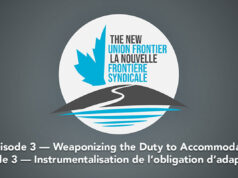On Tuesday, February 1, 2022, the National President of the Customs and Immigration Union, Mark Weber, testified in front of the House of Commons Standing Committee on Public Safety and National Security as part of their study on gun control and illegal arms trafficking, highlighting the union’s concerns regarding Canada’s ability to curb smuggling activities.
Border Officers must be allowed to operate between ports of entry
In his opening statement, National President Weber brought to the Committee’s attention three areas of particular importance: Long-standing and widespread understaffing at CBSA, important operational gaps impacting highway, marine, and rail modes of operation, and the pressing need for increased reliance on the unique expertise of CBSA personnel, including between ports of entry.
“If the Government of Canada is serious in addressing the problem of illegal firearms smuggled across the border, the mandate of border officers must be expanded so as to assist in patrolling between crossings” said Weber to the Committee, criticizing the current inability of CBSA officers to operate outside ports of entry. “It is a well-known fact that the border between Canada and our neighbours to the south is the longest undefended border in the world. While this is certainly a testament to the good relations between our two countries, it also comes with its own unique security challenges. To mitigate these, we invite the Government of Canada to empower its CBSA officers to further help curb smuggling activities into Canada from land or sea routes, including between ports of entry.”
Outdated and insufficient infrastructure
During the three-hour long session, the CIU National President also highlighted issues affecting most modes of operation, including outdated or insufficient infrastructure, pointing to rail operations as a particularly glaring example, amongst others: “The reality is that our current operational abilities in the rail field are virtually non-existent: Canada has zero examination capabilities directly at the border, due in part to geographical issues, inadequate tools, and political decisions not to force rail carriers to supply the necessary facilities. In other words: There is an almost 0% chance that any illegal weapon entering the country via rail will ever be found.”
National President Weber’s message was clear: CBSA needs to not only address the pressing staffing issues that compound important operational gaps, but it should also further rely on the unique expertise of its officers when it comes to policy decisions. “Too often will management take a course of action that either does not take into account, or blatantly disregards, the reality in the field. We believe that this could be corrected through meaningful consultation with, and effective involvement of, our members.”
A recording of the Committee proceedings can be viewed here.





